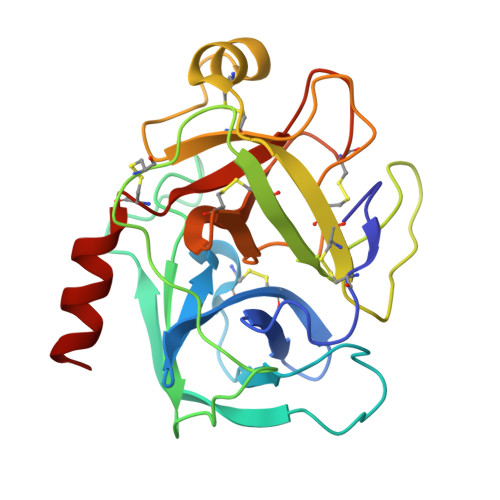Charges Shift Protonation: Neutron Diffraction Reveals that Aniline and 2-Aminopyridine Become Protonated Upon Binding to Trypsin.
Schiebel, J., Gaspari, R., Sandner, A., Ngo, K., Gerber, H.D., Cavalli, A., Ostermann, A., Heine, A., Klebe, G.(2017) Angew Chem Int Ed Engl 56: 4887-4890
- PubMed: 28371253
- DOI: https://doi.org/10.1002/anie.201701038
- Primary Citation of Related Structures:
5MN1, 5MNA, 5MNB, 5MNC, 5MNX, 5MNY, 5MON, 5MOO - PubMed Abstract:
Hydrogen atoms play a key role in protein-ligand recognition. They determine the quality of established H-bonding networks and define the protonation of bound ligands. Structural visualization of H atoms by X-ray crystallography is rarely possible. We used neutron diffraction to determine the positions of the hydrogen atoms in the ligands aniline and 2-aminopyridine bound to the archetypical serine protease trypsin. The resulting structures show the best resolution so far achieved for proteins larger than 100 residues and allow an accurate description of the protonation states and interactions with nearby water molecules. Despite its low pK a of 4.6 and a large distance of 3.6 Å to the charged Asp189 at the bottom of the S1 pocket, the amino group of aniline becomes protonated, whereas in 2-aminopyridine, the pyridine nitrogen picks up the proton although its amino group is 1.6 Å closer to Asp189. Therefore, apart from charge-charge distances, tautomer stability is decisive for the resulting binding poses, an aspect that is pivotal for predicting correct binding.
- Institut für Pharmazeutische Chemie, Philipps-Universität Marburg, Marbacher Weg 6, 35032, Marburg, Germany.
Organizational Affiliation:


















